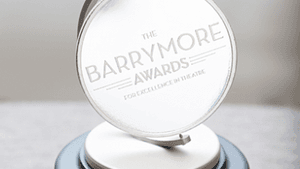Stay in the Loop
BSR publishes on a weekly schedule, with an email newsletter every Wednesday and Thursday morning. There’s no paywall, and subscribing is always free.
Keeping the Barrymore Awards relevant
Can the Barrymore Awards adapt before they die out?

Perhaps you missed what history will surely come to know as the Great Barrymore Awards Facebook Explosion of 2017. It began when I posted that the Barrymore Awards for Excellence in Theatre suffers from the same case of tone-deaf privilege as the similarly exclusionary Dîner en Blanc. My point was to dig into ways we might reconceptualize our awards and their participation criteria to better serve our community and represent our values.
Pertinent questions
I asked, “What would happen if we said, 'This year, to be Barrymore eligible, you must demonstrate a 50 percent improvement in diverse casting practices from your prior season?’ What are the awards for? What is elevated as a result? How could Philadelphia innovate its awards so as to be at the forefront of a national movement?”
Artists understand that context is everything. The Barrymore nominations were recently announced, as they always are this time of year, but the day-to-day context in which we operate has changed significantly in the past year. An NPR headline appears on my Facebook feed: “With Trump White House, Are Ethics Issues Becoming Part of the Scenery?” Making a “good” play is no longer enough; being a talented director or writer and doing your job well is the standard. Excellence now lies somewhere else.
Awards, by their existence, highlight what we value. A quick look at our awards system shows that we value plays and musicals over other kinds of artistic media; discrete gender categories; and actors, directors, and designers over writers, producers, and stage managers. And we value money. Theater Philadelphia’s awards will steward $75k into the theater community this year (one middle-class person’s annual salary).
Our community, our values
However, the value I keep hearing from Barrymore nominees, judges, participating theaters and Theatre Philadelphia itself, the reason these people love living and working in Philadelphia, is community. Yet I don’t see enough awards fostering community or supporting contributions to community. The Victory Foundation Award for Outstanding Theatre Education Program and the Virginia Brown Martin Philadelphia Award are notable exceptions, and good templates for how the awards might be expanded as our values shift.

We say we value diversity, but of this year’s 96 individual nominations, less than 10 percent went to people of color. Theatre Philadelphia has since taken steps to diversify the upcoming season’s Barrymore judging applicant pool. The organization hopes this focus will yield greater diversity among the nominated productions and individuals, but we won’t know until next year if the initiative will bear fruit.
We say as a community that we value bringing younger generations to the theater, but the Barrymores offer no recognition for young artists. Their voices must be recognized before we end up putting theater on a shelf next to the fax machine and floppy disk.
Better than excellence
Can an awards system recognize theatrical excellence and simultaneously accomplish something more? Friends responded to my post with suggestions including awards for community engagement and partnerships, physical or devised work, theater for young audiences, interdisciplinary collaboration, museum work, a rotating “surprise” category that changes every year, and even a category called “Anything that isn’t about or by dead white men.”

Another friend suggested an award supporting eco-friendly design practices. How would that challenge our designers in a new way and level the playing field between companies with disparate budgets? Someone even joked that we should include standardized patient work — an actor’s most reliable paycheck — in the award mix, but interdisciplinary collaboration is no joke. It’s an innovation that keeps what we do, and who we are, relevant.
Toronto’s regional theater governing board has been working on the removal of gender-designated award categories (i.e., best actress/actor) for a year. My now-infamous FB thread also reaped a good bit of support for that removal in favor of simply recognizing the year’s best performances. Playwright James Ijames, a member of Theatre Philadelphia’s Diversity Committee, commented, “I’m pro-this.” Theater maker and activist Susanne Collins added, “I would love to see the gendered element eliminated. It’s exclusionary of trans/non-binary people.”
Act now
Unlike many of the positive suggestions put forth on the thread that couldn’t realistically be implemented this year, one suggestion can be implemented immediately: removing gendered categories. If Theatre Philadelphia decided to make this change now, Philadelphia would be the first city in the country to do so. It would be national news. It wouldn’t solve everything, but it would send a strong message that we are on the leading edge of the national conversation and that Philadelphia is the best city in which to live and work in if you value more than just making some good plays.
The Barrymores are on the verge of being eclipsed. Awards that match the inclusive spirit of our city and recognize the breadth of the work, such as the Suryas (with categories such as the “Bonaly Recognition of Creation of Community Joy”), and another loose group of artists creating a less formal event where theater makers of all stripes can acknowledge how they have inspired each other through their work, aren’t “anti-Barrymores.” However, they do highlight where the Barrymores have failed to respond to growth in the community.
You know those daily calls to action many of us have been working on? Here’s one for Theatre Philadelphia: convene an emergency meeting and remove the gender designations as a strong show of faith that you’re listening and willing to innovate. You know it’s the right thing to do, and it's low-hanging fruit. Then send out a national press release — and let’s remind the world that artists are always at the forefront of change.
What, When, Where
2017 Barrymore Awards for Excellence in Theatre. October 30, 2017, at the Merriam Theater, 250 S. Broad Street, Philadelphia. (267) 761-9950 or theatrephiladelphia.org.
Sign up for our newsletter
All of the week's new articles, all in one place. Sign up for the free weekly BSR newsletters, and don't miss a conversation.
 Jennifer MacMillan
Jennifer MacMillan